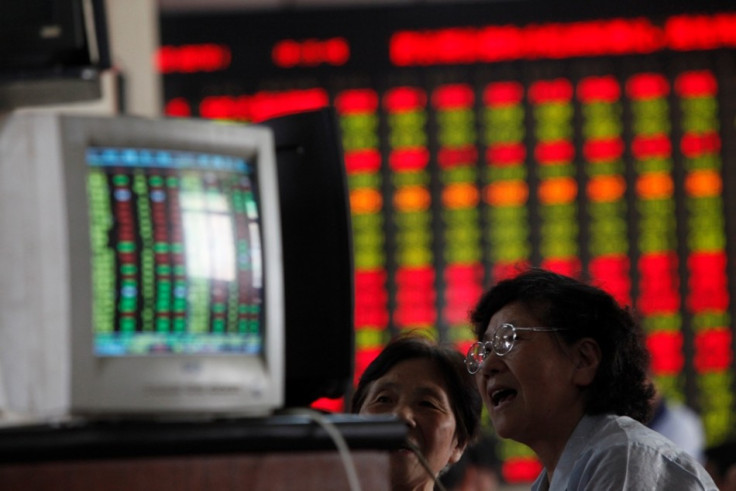Asian Markets Drop As China Communist Party Plenum Disappoints

Asian markets traded to the downside on 13 November after a communiqué from a key Communist Party meeting in China failed to provide concrete details about the nation's reform road-map.
The Japanese Nikkei finished 0.15% lower or 21.52 points at 14,567.16
Australia's S&P/ASX finished 1.37% lower or 73.90 points at 5,319.20
South Korea's Kospi finished 1.60% lower or 31.92 points at 1,963.56.
The Shanghai Composite finished 1.83% lower or 38.83 points at 2,087.94.
Hong Kong's Hang Seng was trading 1.81% lower or 413.55 points to 22,487.86.
India's BSE Sensex was trading 0.29% lower or 57.93 points to 20,243.68.
In Beijing, the four-day closed-door meeting of senior Communist Party officials ended on 12 November with a vaguely worded communiqué, devoid of specifics about how China's new leaders would reform the world's second largest economy over the next decade.
The communiqué did, however, mention that the government would push for fewer investment restrictions and greater rights for farmers.
Economists were left wondering as to how to interpret the document.
Mark Williams, an economist at Capital Economics, said in a note to clients: "It hasn't met the high expectations that President Xi Jinping, among others, has raised. There are some steps in the right direction, but it seems to me to lack an overarching vision. This was an opportunity for the party to lay out a clear vision for where the country is heading. If they had been able to do that successfully, it would have had a big impact on the behavior of officials. However, I don't think they have been given a clear steer. I was hoping the reforms would have been tied together into a broader vision somehow. China's imbalances are so great that you need more than a piecemeal approach."
Minggao Shen,head of China research at Citi, said in a note to clients: "The information available for now suggests that an actionable plan will only be rolled out gradually going forward, and that the party has determined to simultaneously achieve reform and a growth target (doubling the 2010 gross domestic product in real terms) by 2020, which likely rules out the possibility of a short-term pain scenario".
Fan Zhang, an economist at UOB Kay Hian, said in a note to clients: "It is very likely the government will allow private investment to enter into monopoly industries such as financials, energy and power, transportation, telecoms and public services. Though no details are being given for how the government will split revenue and responsibility for spending between central and local governments, we expect such reform will be one of the priorities for the government in the near to medium term. We believe more efforts will be made to protect rural residents' property rights, which is regarded as one of the most important measures to accelerate rural land reform. It is very likely there will be less restriction and lower entry barriers for foreign investors to enter China."
Wall Street Mixed
On Wall Street, most indices ended lower on 12 November with investors contemplating the Federal Reserve's next move, after conflicting remarks from Fed presidents about the future pace of the central bank's asset buying.
Dallas Fed President Dennis Lockhart said that a QE taper remained a possibility after the Federal Open Market Committee's policy meeting on 17-18 December.
The Dow finished 32.43 points lower or 0.2% at 15,750.67 while the S&P 500 closed 4.2 points lower or 0.2% at 1,767.69. The Nasdaq ended flat at 3,919.92.
"The market was struggling to advance, after coming too far, too fast," Mark Luschini, chief investment strategist at Janney Montgomery Scott told CNBC.
Company Stock Movements
In Shanghai, automaker FAW Car lost 4% while energy major Sinopec lost 2% on news that Beijing would push for a modern corporate system for state-owned enterprises.
Defense equipment maker Aerosun rallied 10% on news that the government would strengthen army reforms.
In Tokyo, Sumitomo Mitsui Financial added 1.5% after the bank raised its full-year net profit outlook to 750bn yen from 580bn yen.
Automaker Isuzu Motors droped 0.7% after it slashed its full-year sales guidance by 100bn yen. However, the firm left its operating profit forecast of 180bn yen unchanged.
Sony rose some 3% after activist investor Daniel Loeb told CNBC overnight that he has a good relationship with the Japanese firm.
In Mumbai, shoe-maker Bata jumped 4.3% on news that parent firm Bata BN BV had acquired close to a 1% stake in the Indian operation through an open market transaction.
In Sydney, shares in Commonwealth Bank of Australia, National Australia Bank and Australia and New Zealand Banking lost over 2% each.
Building products maker CSR rallied 9% after it reported that its first-half net profit almost tripled.
Warrnambool Cheese rallied 6.5% after fellow Australian firm Murray Goulburn Co-operative raised its buyout offer for the dairy firm.
Retailer Myer Holdings added over 2% after it reported a 0.4% increase in first-quarter sales.
In Seoul, index heavyweight Samsung Electronics dropped 2.5% while LG Display lost 2%.
© Copyright IBTimes 2025. All rights reserved.






















